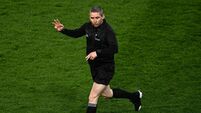Letters by anti-Treaty soldiers before execution show the tragedy of the Civil War

The letters written to their parents by two executed anti-Treaty soldiers on the eve of their deaths are striking reminders of dignity and forgiveness.
The last letters written to their parents by two executed anti-Treaty soldiers the eve of their deaths are striking reminders of dignity, forgiveness and lives unnecessarily wasted during Ireland’s Civil War, on the centenary of their deaths, which takes place this week.
Youghal men Michael Fitzgerald and Patrick O’Reilly, both aged 24 and members of the Cork No.1 IRA Brigade, had socialised in a ‘safe house’ in Clashmore, west Waterford on the night of December 3rd 1923.
















